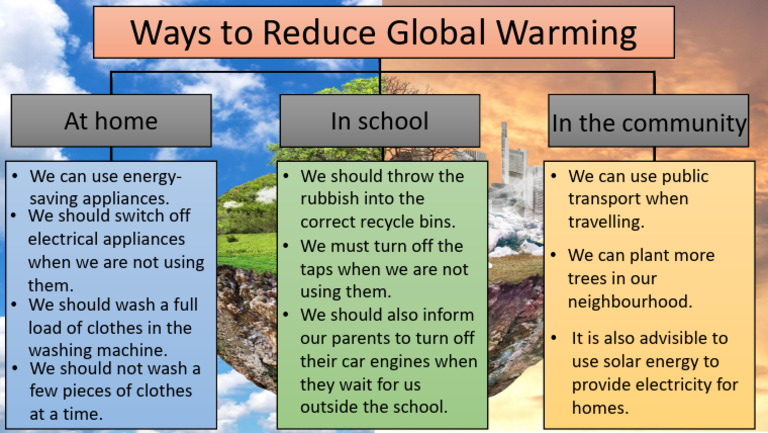Global warming has emerged as one of the most exigent challenges facing humanity today, stemming largely from anthropogenic activities that release excessive greenhouse gases into the atmosphere. As concerned global citizens, it is imperative that we acknowledge our role in this crisis and take actionable measures to mitigate its impact. Below are practical tips that individuals can adopt to help reduce global warming, illustrating that every effort, no matter how small, counts.
Understanding the ramifications of our daily activities is crucial. From energy consumption at home to the transportation methods we choose, our behaviors have direct consequences on the environment. Thus, embracing sustainable practices is a pivotal step in addressing global warming.
Rethinking Energy Consumption
One of the most significant contributors to greenhouse gas emissions is the energy we utilize to power our homes and devices. Thus, transitioning to renewable energy sources is a commendable approach. Opting for solar panels or wind energy can drastically reduce your carbon footprint. For those who are unable to make such a commitment, being mindful of energy usage remains vital.
Simple actions such as switching off lights in unoccupied rooms, utilizing energy-efficient appliances, and investing in LED bulbs can lead to substantial energy savings. Furthermore, maintaining optimal insulation in your home can minimize the need for heating and cooling, which account for a considerable proportion of household energy consumption. It is also wise to conduct an energy audit to identify areas where energy inefficiencies lie.
Adopting Sustainable Transportation
The transportation sector is a major player in the realm of greenhouse gas emissions. One viable way to reduce your carbon footprint is by re-evaluating how you commute. Embracing public transportation can significantly diminish the number of vehicles on the road, thereby curbing emissions.
Moreover, carpooling or utilizing ride-sharing options not only reduces environmental impact but also facilitates community interaction. For those residing in urban environments, cycling or walking for shorter distances can serve as an environmentally-friendly and health-promoting alternative.
When vehicle ownership is necessary, it’s prudent to consider electric or hybrid vehicles, which emit fewer pollutants compared to traditional gasoline-powered cars. Furthermore, ensuring that your vehicle is well-maintained can enhance fuel efficiency and reduce harmful emissions.
Reshaping Dietary Habits
Your dietary choices can have profound implications on the environment. The production of livestock, for instance, generates significant levels of methane, a potent greenhouse gas. By moderating your meat consumption and embracing a more plant-based diet, you can play an integral role in mitigating climate change.
Incorporating more fruits, vegetables, and legumes into your meals not only benefits your health but also reduces the environmental burden of food production. Additionally, sourcing food locally can minimize transportation emissions and support local farmers. Whenever possible, selecting organic produce further supports sustainable agricultural practices.
Conserving Water Wisely
While often overlooked, water conservation plays an essential role in addressing global warming. The energy required to pump, heat, and treat water constitutes a significant component of a household’s energy use. By adopting water-saving practices, you not only conserve this precious resource but also reduce your indirect carbon footprint.
Simple steps such as fixing leaks, taking shorter showers, or utilizing water-efficient fixtures can result in substantial savings. Rainwater harvesting systems can also be implemented to use for irrigation and other non-potable applications, contributing to more sustainable water management.
Participating in Community Initiatives
Collective action is paramount in the battle against climate change. Engaging with local organizations dedicated to environmental advocacy can amplify your individual efforts. This involvement may take the form of volunteering for tree-planting campaigns, participating in community clean-ups, or supporting policies aimed at lowering carbon emissions.
Establishing or joining community gardens also fosters a sense of community while promoting sustainable practices. Sharing resources and knowledge in these collaborative endeavors can enhance collective resilience against the effects of climate change.
Embracing Minimalism and Reduction Practices
In a consumer-driven society, the philosophy of minimalism can have a significant impact on reducing waste and emissions. By prioritizing quality over quantity, individuals can reduce their purchases and, consequently, the carbon footprint associated with manufacturing and transportation.
Prioritizing second-hand products is another effective approach; it not only reduces waste but also extends the lifecycle of items, mitigating the demand for new production. Additionally, engaging in conscious purchasing and supporting ethical brands that prioritize sustainability can foster a greener economy.
Educating Yourself and Others
Knowledge is power. Understanding the nuances of climate change and global warming equips individuals to make informed decisions and to influence others. Being well-informed about the latest advancements in sustainability can facilitate meaningful discussions and inspire others to adopt eco-friendly practices.
Sharing insights through social media, community forums, or local educational workshops can foster a culture of environmental awareness. Engaging youth and encouraging them to be stewards of the environment is essential for cultivating a sustainable future.
Overall, the challenge of global warming may seem daunting, yet the cumulative efforts of individuals can indeed make a difference. Through conscientious decision-making, lifestyle adjustments, and active participation in various endeavors, individuals can substantially contribute to the global crusade against climate change. By adopting these practical tips, you can be part of the solution, catalyzing change in your community and beyond.






